

Inquiry-based Learning - About Us. Global Education. SideVibe. Image Detective. Enquiring Minds. So you like the idea trying out enquiry-based teaching and learning in your own school?
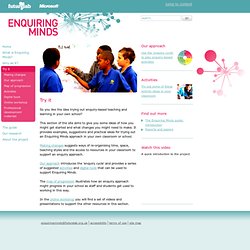
This section of the site aims to give you some ideas of how you might get started and what changes you might need to make. It provides examples, suggestions and practical ideas for trying out an Enquiring Minds approach in your own classroom or school. Making changes suggests ways of re-organising time, space, teaching styles and the access to resources in your classroom to support an enquiry approach. Our approach introduces the 'enquiry cycle' and provides a series of suggested activities and digital tools that can be used to support Enquiring Minds.
The map of progression illustrates how an enquiry approach might progress in your school as staff and students get used to working in this way. In the online workshop you will find a set of videos and presentations to support the other resources in this section. QuestGarden.com. Search for WebQuests. Inquiry-based learning.
Inquiry-based learning (also enquiry-based learning in British English)[1] starts by posing questions, problems or scenarios—rather than simply presenting established facts or portraying a smooth path to knowledge.
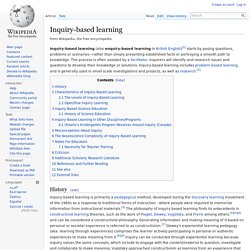
The process is often assisted by a facilitator. Inquirers will identify and research issues and questions to develop their knowledge or solutions. Inquiry-based learning includes problem-based learning, and is generally used in small scale investigations and projects, as well as research.[2] History[edit] In the 1960s Joseph Schwab called for inquiry to be divided into four distinct levels.[10] This was later formalized by Marshall Herron in 1971, who developed the Herron Scale to evaluate the amount of inquiry within a particular lab exercise.[11] Since then, there have been a number of revisions proposed and inquiry can take various forms.
Inquiry Based Teaching: Reasons To Use Inquiry Based Teaching. Inquiry Learning Vs. Standardized Content: Can They Coexist? By Thom Markham As Common Core State Standards are incorporated from school to school across the country, educators are discussing their value.
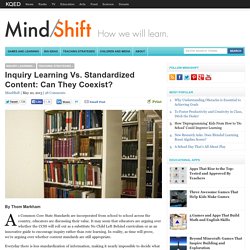
It may seem that educators are arguing over whether the CCSS will roll out as a substitute No Child Left Behind curriculum or as an innovative guide to encourage inquiry rather than rote learning. In reality, as time will prove, we’re arguing over whether content standards are still appropriate. Everyday there is less standardization of information, making it nearly impossible to decide what a tenth-grader should know. Why Inquiry Learning is Worth the Trouble. Visualization of SLA principal Chris Lehmann's 2011 talk: guiding kids' to thinking about how they think.
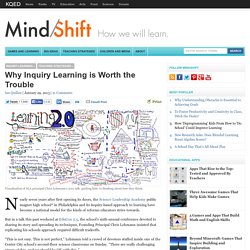
Nearly seven years after first opening its doors, the Science Leadership Academy public magnet high school* in Philadelphia and its inquiry-based approach to learning have become a national model for the kinds of reforms educators strive towards. But in a talk this past weekend at EduCon 2.5, the school’s sixth-annual conference devoted to sharing its story and spreading its techniques, Founding Principal Chris Lehmann insisted that replicating his schools approach required difficult tradeoffs. “This is not easy. This is not perfect,” Lehmann told a crowd of devotees stuffed inside one of the Center City school’s second-floor science classrooms on Sunday. “There are really challenging pieces of this, and we should be OK with this.” “Inquiry means living in the soup.
“To me it comes down to process,” Lehmann said. “Oh God, yeah,” Lehmann said in response to the latter teacher. Related. Seeing, wondering, theorizing, learning: Inquiry-based instruction with Kishia Moore. There they go — Mitchell County teacher Kishia Moore and her class of seventeen first graders — up Gem Mountain not far from their school, Greenlee Primary, to pan for gemstones for use in their NC Standard Course of Study-mandated science unit on minerals.
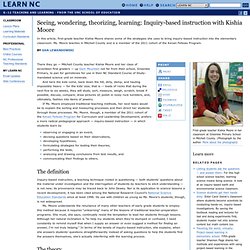
And here the kids come, back down the hill, dirty, damp, and hauling impossibly heavy — for the kids’ size, that is — loads of rocks that during the next five to six weeks, they will study, sort, measure, weigh, scratch, break if possible, discuss, compare, draw pictures of, polish in noisy rock tumblers, and, ultimately, fashion into items of jewelry. If Ms. Moore employed traditional teaching methods, her next tasks would be to explain the sorting and measuring processes and then direct her students through those processes. Ms. The definition Ms. The theory. Impact-research-briefs-inquiry-based-teaching. Inquiry based classroom. Reading Comprehension and Considerate Text, Teaching Today, Glencoe Online. Inquiry-Based Approaches to Learning Few things excite teachers more than when their students take over the role of grand inquisitor.
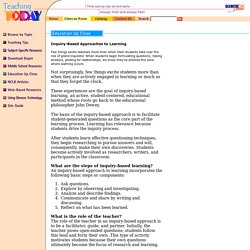
When students begin formulating questions, risking answers, probing for relationships, we know they've entered the zone where learning occurs. Not surprisingly, few things excite students more than when they are actively engaged in learning so much so that they forget the clock. Introduction. AEC394/WC075: What Is Inquiry-Based Instruction? Anna J.
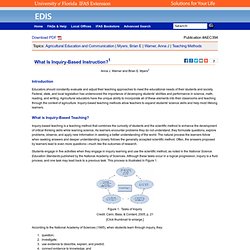
Warner and Brian E. Myers2 Introduction Educators should constantly evaluate and adjust their teaching approaches to meet the educational needs of their students and society. What is IBL? - The Academy of Inquiry Based Learning. Inquiry-Based Learning (IBL) is a student-centered method of teaching Mathematics.
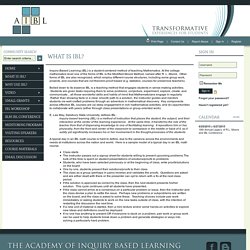
At the college mathematics level one of the forms of IBL is the Modified Moore Method, named after R. L. Moore. What is IBL? - The Academy of Inquiry Based Learning. Inquiry-based Learning - About Us. JIBLM.org - Journal of Inquiry-Based Learning in Mathematics - IBL Course Notes in Mathematics. Inquiry-based Learning: Explanation. What is inquiry-based learning?
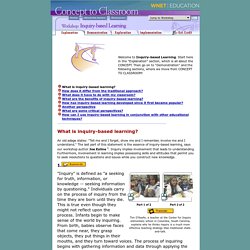
An old adage states: "Tell me and I forget, show me and I remember, involve me and I understand. " The last part of this statement is the essence of inquiry-based learning, says our workshop author Joe Exline 1. Inquiry implies involvement that leads to understanding. BBB%20Balance%20Healey. A101_Edelson_etal_99. Curious Homework: An Inquiry Project for Students and Parents. Photo credit: iStockphoto International educator Scot Hoffman is a big believer in the power of curiosity to drive learning.

After nearly two decades of teaching around the globe, he also realizes that school isn't always so hospitable to inquiring minds. (As Einstein said, "It's a miracle that curiosity survives formal education. ") Creating Classrooms We Need: 8 Ways Into Inquiry Learning. If kids can access information from sources other than school, and if school is no longer the only place where information lives, what, then happens to the role of this institution? “Our whole reason for showing up for school has changed, but infrastructure has stayed behind,” said Diana Laufenberg, who taught history at the progressive public school Science Leadership Academy for many years. Laufenberg provided some insight into how she guided students to find their own learning paths at school, and enumerated some of these ideas at SXSWEdu last week. 1.
BE FLEXIBLE. CBS_InquiryBased. TWT: Inquiry-based Learning Strategy. What is Inquiry-based learning? The old adage, “Tell me and I forget, show me and I remember, involve me and I understand” describes the core of inquiry-based learning. Inquiry is the process of seeking truth, information, or knowledge by questioning. Questioning! That is the key. Create a Culture of Questioning and Inquiry. I have often suggested to teachers that when students have access to technology, whether it is provided by the school in a 1:1, BYOD, or simply the smart phone in their pocket, there should never be a question that goes unanswered –or un-followed.
These are teachable moments for how to effectively search for information (information literacy & digital literacy) and allowing the time for students to explore connected ideas brings more depth to the learning, and allows students to make sense of things as they combine new information what they already know and understand, as well as to identify misunderstandings. Questioning leads to synthesis. It also makes the learning personal for students. What I discovered in the 300+ observations I have done for our 21 st Century Learning grant work was that the problem isn’t necessarily about allowing time for students to answer questions. Ask: “What do you wonder?” This seems like a simple thing to do – and it is! Question wall Question journal. Curious Homework: An Inquiry Project for Students and Parents.
36 Core Teacher Apps For Inquiry Learning With iPads. 36 Core Teacher Apps For Inquiry Learning With iPads The interest in inquiry-based learning seems to ebb and flow based on–well, it’s not clear why it ever ebbs. In short, it is a student-centered, Constructivist approach to learning that requires critical thinking, and benefits from technology, collaboration, resourcefulness, and other modern learning skills that never seem to fall out of favor themselves. Regardless, St Oliver Plunkett Primary School has put together two very useful images that can help you populate your iPad–or classroom of iPads–with apps that support both inquiry-based learning (the second image below), and a more general approach to pedagogy based on Apple’s uber-popular tablet (the top image). The original pdf for the first file can be downloaded here. 36 Core Teacher Apps For Inquiry Learning With iPads; image attribution St. How BYOD Programs Can Fuel Inquiry Learning. Digital Tools Erin Scott Launching a Bring Your Own Device program can be both exhilarating and scary.
The opportunity to extend access to technology in the classroom and at home is enticing, but school districts can get hung up on important details like providing a strong network, making sure each child has a device, and questions around distraction. Inquiry Based Learning. Inquiry-based Learning: Demonstration. Harvard Education Letter. Volume 27, Number 5September/October 2011 One small change can yield big results By Dan Rothstein and Luz Santana. Inquiry-Based Learning. Examples of Inquiry Based Lessons. Inquiry-Based Lesson Plans. Investigating Animals: Using Nonfiction for Inquiry-based Research. ReadWriteThink couldn't publish all of this great content without literacy experts to write and review for us.
If you've got lessons plans, activities, or other ideas you'd like to contribute, we'd love to hear from you. More Find the latest in professional publications, learn new techniques and strategies, and find out how you can connect with other literacy professionals. OER Commons. 4 Phases of Inquiry-Based Learning: A Guide For Teachers.